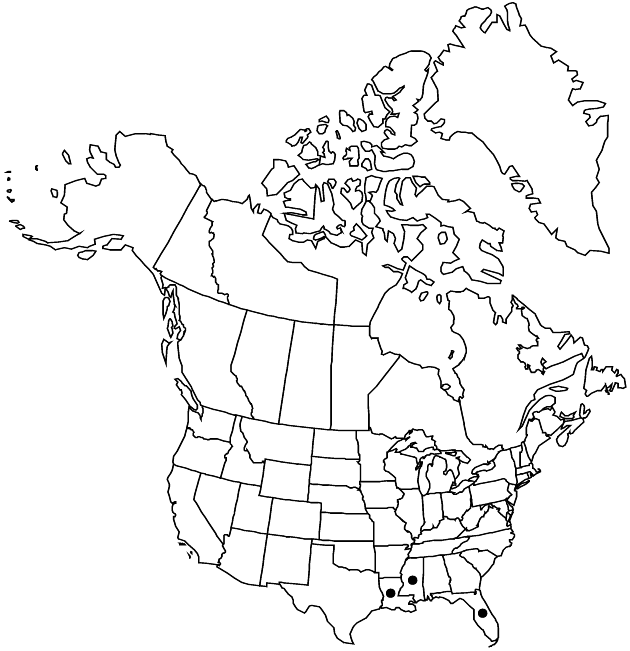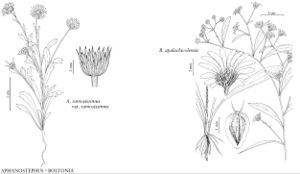Difference between revisions of "Boltonia apalachicolensis"
Syst. Bot. 12: 133, fig. 1. 1987.
FNA>Volume Importer |
imported>Volume Importer |
||
| (3 intermediate revisions by 2 users not shown) | |||
| Line 8: | Line 8: | ||
}} | }} | ||
|common_names=Apalachicola doll’s-daisy | |common_names=Apalachicola doll’s-daisy | ||
| + | |special_status={{Treatment/ID/Special_status | ||
| + | |code=F | ||
| + | |label=Illustrated | ||
| + | }}{{Treatment/ID/Special_status | ||
| + | |code=E | ||
| + | |label=Endemic | ||
| + | }} | ||
|basionyms= | |basionyms= | ||
|synonyms= | |synonyms= | ||
| Line 32: | Line 39: | ||
-->{{#Taxon: | -->{{#Taxon: | ||
name=Boltonia apalachicolensis | name=Boltonia apalachicolensis | ||
| − | |||
|authority=L. C. Anderson | |authority=L. C. Anderson | ||
|rank=species | |rank=species | ||
| Line 46: | Line 52: | ||
|publication title=Syst. Bot. | |publication title=Syst. Bot. | ||
|publication year=1987 | |publication year=1987 | ||
| − | |special status= | + | |special status=Illustrated;Endemic |
| − | |source xml=https:// | + | |source xml=https://bitbucket.org/aafc-mbb/fna-data-curation/src/2e0870ddd59836b60bcf96646a41e87ea5a5943a/coarse_grained_fna_xml/V19-20-21/V20_818.xml |
|tribe=Asteraceae tribe Astereae | |tribe=Asteraceae tribe Astereae | ||
|genus=Boltonia | |genus=Boltonia | ||
Latest revision as of 20:05, 5 November 2020
Plants 50–180 cm; stolons and rhizomes absent, fallen stems frequently rooting at nodes. Stems erect. Leaf blades linear to oblanceolate, obovate, or oblique-elliptic; cauline 45–120 × 8–12 mm, bases not decurrent. Heads in corymbiform arrays, branches spreading to ascending, most bracts leaflike, 10–40 × 3–8 mm. Peduncles 6–35 mm; bracts (0–)1–3, linear to linear-oblanceolate, 1–2.5 mm. Involucres 2–2.5(–4) × 4–6 mm. Phyllaries in 2–4 series, linear to subulate, subequal, 0–4 merging down peduncle; outer 1.3–2 × 0.3–0.6 mm; inner 1.5–3 × 0.3–0.6. Ray florets 20–35; corollas white to lilac, laminae 5–9 mm, tubes 0.6–0.9 mm. Disc florets 80–134; corollas 2.1–2.9 mm. Cypselae obovoid, 1.3–2.1 × 0.8–1.3 mm, wings 0.2–0.3 mm wide; pappi awns 0.3–0.8 mm. 2n = 18.
Phenology: Flowering late Sep–Dec.
Habitat: Moist, gray sand, in semishade or deep shade, hardwood floodplain forests
Elevation: 0–10 m
Distribution

Fla., La., Miss.
Discussion
Selected References
None.
